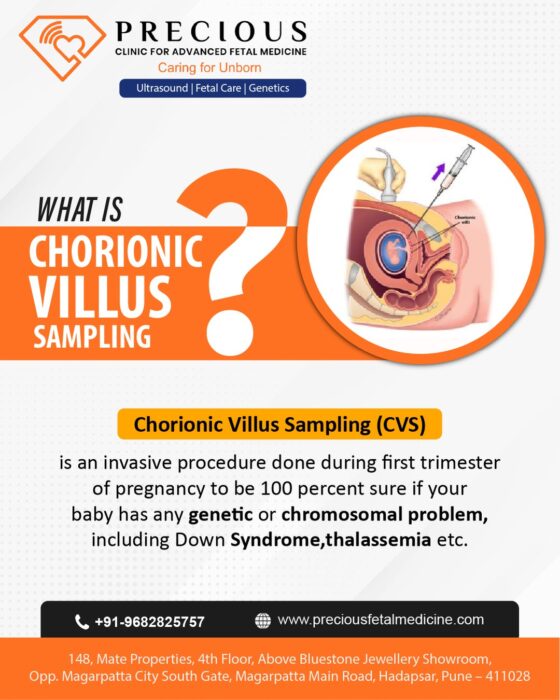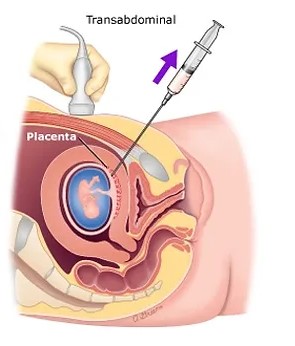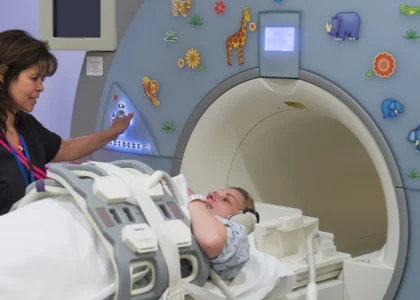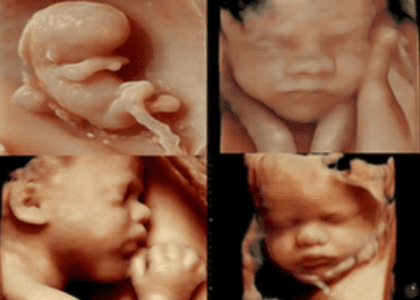What is Chorionic Villous Sampling?
Chorionic Villous Sampling (CVS) is a highly accurate prenatal diagnostic test that is performed during pregnancy to detect certain genetic conditions and chromosomal abnormalities in the developing fetus. In this procedure, a small sample of the placental tissue is taken to detect any chromosomal problems or any genetic disorders in the baby. The placenta is an organ that forms during pregnancy in the uterus to transfer blood and essential nutrients from the mother to the fetus.

CVS is usually performed between the 11 and 14 weeks of pregnancy, earlier than other invasive diagnostic tests like amniocentesis.
When is CVS required?
Chorionic villus sampling is not routinely done during pregnancy; your doctor may recommend it if you have certain conditions, like:
- Previously had a child with any genetic condition or chromosomal abnormality.
- Results of prenatal screening show the baby is at high risk of Down syndrome.
- Family history of any genetic condition like sickle cell disease, thalassemia, or muscular dystrophy
- If both parents are carriers of a particular condition
- Advanced maternal age
Before undergoing CVS, consider consulting a fetal medicine specialist to discuss your specific conditions and clear out your doubts and issues.
What are the types of Chorionic villous sampling?
CVS is basically of two types:
- Trans-cervical: This type of Chorionic villus sampling involves the insertion of a catheter through the cervix into the placenta to extract the tissue sample.

2. Trans-abdominal: As its name suggests, this procedure is done by inserting the needle through the abdomen and uterus into the placenta to collect the sample. It can be performed under local anaesthesia to help alleviate discomfort.

What to expect before the Chorionic villous sampling procedure?
Before the Chorionic Villus Sampling (CVS), your doctor will brief you on what will happen during the procedure and also discuss the risks and benefits of the procedure. Before the procedure, you also have an ultrasound that can help detect the gestational age, and rule out any major structural problems in the fetus.
What happens during the Chorionic villous sampling test?
The Chorionic villous sampling test is carried out in a doctor’s clinic under the continuous guidance of an ultrasound scan. Your fetal medicine expert can perform the test using two different methods, trans-cervical and trans-abdominal. The method of procedure depends on the location of the placenta. It is an OPD-based procedure, after the procedure you will be under observation of a doctor for a certain period and then you are allowed to go home. Hospitalisation is usually not required after this test, but avoiding heavy work and long-distance travel is recommended.
(Also Read: Down Syndrome Screening: Why Is It Important? (preciousfetalmedicine.com))
Discussing the results
After the procedure, your doctor will send the sample of cells to the specialised genetic laboratory for testing.

You may receive your first result in three to five days after the test, and to get a more detailed result, you have to wait until two weeks. After this, your doctor will discuss the results with you so that you can make an informed decision about your pregnancy. Chorionic villus sampling can detect any genetic or chromosomal disorder but cannot determine the severity of the issue.
In Conclusion
Chorionic villus sampling, or CVS, is a prenatal test to detect any genetic problems in the baby. It is a very safe and effective procedure that includes minimal discomfort and is done around the 11th to 14th weeks of pregnancy.
After the process, your fetal medicine specialist will discuss the results with you and assist you in making an informed decision about your pregnancy if your baby is having particular genetic condition.
Chorionic Villous Sampling (CVS) in Pune
Consult Dr Tejas Tamhane, consultant in Fetal Medicine, to detect and manage genetic and chromosomal disorders.



